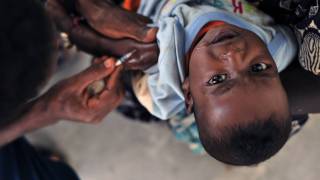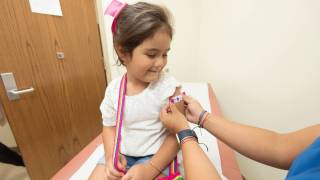Measles Vaccination Rates Decrease During COVID-19

Despite recommendations that children maintain their approved vaccination schedule during the COVID-19 pandemic, rates have decreased in several states.
Texas A&M University (TAMU) School of Public Health and other research institutions looked at childhood immunization rates in Texas to see how childhood immunizations changed over ten years at four age milestones: one month, five months, 16 months, and 24 months.
These results suggest that strategies to mitigate transmission of the SARS-CoV-2 beta coronavirus may have had unintended consequences in terms of reductions in vaccination among children in Texas.
In the study, led by public health doctoral student Tasmiah Nuzhath and published in the journal Vaccine in April 2021, the researchers found that the declines were most significant for the 5-month-old (47%) and 16-month-old (58%) groups.
Immunizations in clinics or doctor’s offices, as opposed to hospitals, were the most affected by the pandemic.
Their analysis of county-level data found that 5-month-old children in rural locations had more significant declines in immunization rates than those living in urban areas.
They also found that there was no decrease in Hepatitis B vaccinations given at birth.
Researchers also found that uptake of most vaccines appeared to increase before the pandemic between May 2010 and May 2019, except for a measles vaccine. The measles vaccine coverage has been declining in Texas since 2015.
Moreover, a previous study found measles under-vaccinations are a health risk throughout the Americas.
The Pan America Health Organization recently reported about 13% fewer children received their first dose of the MMR vaccine during 2020, compared to the year before. Specifically, a study found 32% of individuals aged 10–40 years old located in Brazil had no antibodies against measles.
Considering the ongoing SARS-CoV-2 transmission, it is paramount that healthcare providers avoid two successive years of low immunization coverage, said these researchers.
In the USA, the M-M-R-II vaccine is commonly available. It is indicated for simultaneous vaccination against measles, mumps, and rubella (German measles). This vaccine is usually given to people 1-year-old or older.
Furthermore, avoiding adverse vaccine interactions between the experimental COVID-19 vaccines and existing U.S. FDA Approved vaccines.
The findings of this study are in line with those focusing on other states.
These results indicate a need for better targeted public health communication to address perceived risks and improved vaccination infrastructure to help overcome barriers to vaccination in rural areas.
And the Texas ImmTrac2’s registry data used in the study might not reflect the actual vaccination coverage at the population level and result in underestimating routine immunizations administered in Texas.
PrecisionVaccinations publishes research-based vaccine news.
Our Trust Standards: Medical Advisory Committee
























